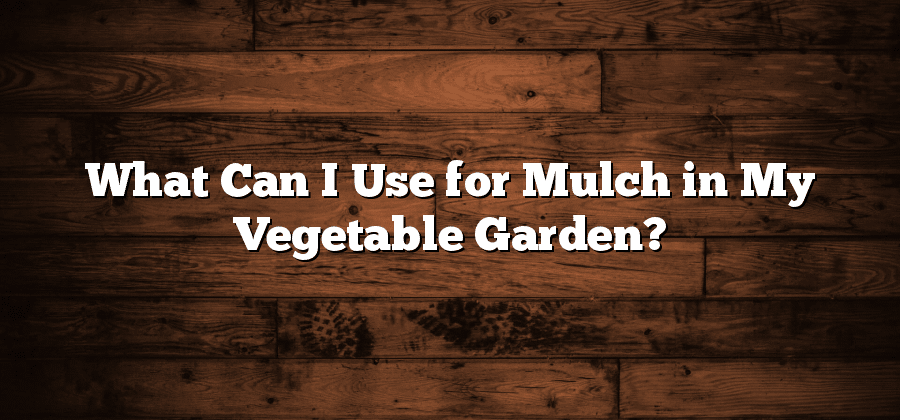Benefits of Mulching in a Vegetable Garden
Mulching is a practice that brings numerous benefits to a vegetable garden. One of the main advantages of mulching is weed control. By applying a layer of organic mulch around the base of vegetables, you create a barrier that prevents weed growth. This not only saves time and effort spent on weeding but also reduces competition for nutrients and water, allowing your vegetables to thrive.
In addition to weed control, mulching helps to conserve moisture in the soil. The layer of mulch acts as a shield against evaporation, preventing water from escaping the soil surface. This is especially crucial during hot summer months when water can quickly be lost due to high temperatures and drying winds. By keeping the soil consistently moist, mulching promotes healthy root development and ensures that your vegetable plants stay hydrated, even during dry spells.
Different Types of Organic Mulch
When it comes to mulching in your vegetable garden, organic options offer several benefits. Organic mulch helps to improve soil health, increase moisture retention, suppress weed growth, and regulate soil temperature. One of the most popular types of organic mulch is straw. Straw mulch is readily available, affordable, and easy to spread. It helps to conserve soil moisture, prevent weed growth, and protect delicate vegetable plants from direct contact with the soil.
Another effective organic mulch option is grass clippings. As an inexpensive option, grass clippings can be obtained easily from your own lawn or from neighbors who regularly mow their lawns. Grass clippings add nutrients to the soil as they decompose and help to maintain soil moisture levels. However, it is important to use dry grass clippings and avoid using clippings from lawns treated with chemicals.
When choosing the right mulch for your vegetable garden, consider the specific needs of your plants, the climate in your region, and the availability of different mulch materials. Experimenting with different types of organic mulch can help you find the one that works best for your garden, ultimately improving overall plant health and productivity.
Choosing the Right Mulch for Your Vegetables
When it comes to choosing the right mulch for your vegetable garden, there are a few factors to consider. Firstly, think about the type of vegetables you are growing. Some vegetables thrive in certain types of mulch, while others may benefit from a different option. For example, root vegetables like carrots and radishes tend to prefer loose, organic mulches such as straw or shredded leaves, as this allows for easier root penetration. On the other hand, leafy greens like lettuce and spinach may benefit from a darker colored mulch, like compost or newspaper, which can help retain moisture and suppress weed growth.
Another aspect to consider is the availability and cost of the mulch. Depending on your location and resources, some mulches may be more readily accessible than others. Grass clippings, for instance, can be a cost-effective option as they are easily available if you mow your lawn regularly. However, it’s important to note that grass clippings should be used with caution, as they can compact and create an impenetrable layer if over-applied. Ultimately, the key is to strike a balance between the needs of your vegetables and the availability of suitable mulch options. By selecting the right mulch, you can create a thriving environment for your vegetables, helping to retain moisture, suppress weeds, and regulate soil temperature.
Straw Mulch: A Popular Choice for Vegetable Gardens
Straw mulch is widely known and used as an effective and popular choice for vegetable gardens. It offers numerous benefits that contribute to the overall health and productivity of the plants. First and foremost, straw mulch helps to retain moisture in the soil, preventing the evaporation of water during hot summer days. This is especially crucial for vegetable gardens as they require consistent moisture levels to thrive. In addition, straw mulch acts as a barrier against weeds, reducing competition for nutrients and preventing unwanted plants from taking over the garden bed. This not only saves time and effort in manual weeding but also allows the vegetables to receive maximum nutrition from the soil. The layer of straw mulch also serves as an insulator, protecting the plant roots from extreme temperatures, both hot and cold, thus ensuring optimal growth and development. Overall, the use of straw mulch in vegetable gardens is an excellent choice for gardeners looking to enhance plant health, conserve water, and minimize weed growth.
Grass Clippings: An Inexpensive Mulch Option
Grass clippings can be an excellent and cost-effective option for mulching in your vegetable garden. As you mow your lawn, instead of throwing away the clippings, save them to use as mulch in your garden beds. Not only does this save you money, but it also reduces waste and gives your plants the nutrients they need to thrive.
When using grass clippings as mulch, it’s important to follow a few guidelines. Make sure the clippings are dry before applying them to your garden beds to prevent them from becoming compacted and potentially harming your plants. Additionally, avoid using clippings that have been treated with chemicals or pesticides, as these can be harmful to your vegetables and the environment. By using grass clippings as mulch, you can create a sustainable and inexpensive way to improve your vegetable garden’s health and productivity.






